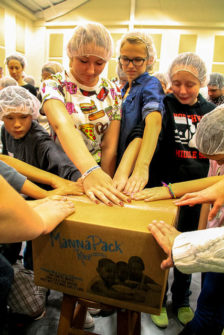
By and large, proselytism—the act of attempting to convert someone to one’s own faith tradition—is frowned upon in sectors of transnational development, humanitarianism, peacebuilding, and human rights. However, in such contexts what constitutes a proselytizing activity is not fully fleshed out. While requiring an aid recipient to convert in order for her to receive goods and services is an obvious breach of international norms against proselytizing, it is less clear whether other FBO practices also violate those norms. As a result of these ambiguities, so-called “religious” activities like prayer have become a site of ethical contestation. My research with transnational faith-based service-advocacy organizations (FBOs) reveals the internal tensions surrounding the inclusion of prayer in service-advocacy. FBOs acknowledge the merits of including prayer in their work; FBOs and their representatives strive to adhere to their own religious values—which may or may not prohibit proselytism in service and advocacy settings. However, at the same time, FBOs also strive to abide by broader international norms of liberal self-determination and cultural and religious respect.
Transnational service and advocacy projects entail specific relations of power between aid-giver and aid-recipient that make proselytism ethically problematic given liberal attachments to individual choice. An aid-recipient might feel that she must convert in order to receive aid, for instance. Thus, while many scholars and policymakers portray FBOs as important international actors, concerns about the extent to which religious practices should be used in such contexts remain. Such concerns are expressed through, in part, the International Red Cross and Red Crescent’s Code of Conduct and USAID’s Rule for Participation by Religious Organizations, which outline the ethics of engaging in traditional service and advocacy. In the latter, religious practices like prayer are treated as inherently problematic in such settings. Yet, the extent to which prayer constitutes a proselytizing act remains unclear.
According to the Oxford English Dictionary, to proselytize is “to convert or attempt to convert from one opinion, religion, or party, etc., to another.” To “attempt” something implies intentional effort; one knowingly is trying to do something. Does the inclusion of prayer in transnational service and advocacy constitute an attempt to convert? While my research with FBOs emphasizes the critical role of prayer in their work, it also reveals the problems of determining whether or not prayer is a proselytizing act.

For the past five years, I have conducted interviews with and observed a number of (primarily Christian) FBOs, including International Justice Mission, the Taizé Community, World Vision, Catholic Relief Services, Lutheran World Relief, Religions for Peace and others. All of these organizations strive to “do good” in the world through peacebuilding, human rights, reconciliation, humanitarian, or development projects. Many of these groups also include prayer in their work, though the contexts vary widely. FBO representatives acknowledge the critical importance of prayer for their organizations. For instance, one of my interviewees described how prayer facilitated the reintegration of divided communities in the aftermath of the civil war in Sierra Leone. Others indicated that prayer is an important tool of religious education in interreligious contexts—showing how the “religious Other” practices his or her faith. My interviewees also argued that prayer is essential for maintaining the spiritual and mental health of FBO representatives themselves, particularly those who work on traumatic human rights issues. These and other examples highlight the centrality of prayer to FBO work. However, the FBO representatives I interviewed are also clearly aware of the ethical issues surrounding their work—especially as relates to the issue of proselytism. In some cases, these issues spill over into decisions about when and how to use prayer.
For instance, many of the FBO representatives I spoke with expressed caution about when and how to include prayer as they want to avoid the possibility of offending or harming the communities they work with. In some cases, this attention to the ethics of prayer stems from the organizations’ broader religious values, which discourage proselytism. In other cases, organizational representatives are more concerned about maintaining access to their work sites, or respecting the religious identities of others, given international norms that discourage proselytism in certain contexts. But whatever the reasons for these concerns, FBOs are questioning whether the employment of prayer in service advocacy settings constitutes a violation of norms against proselytism. However, the content of these debates and discussions reveal some substantial differences in the way policymakers and scholars discuss issues of proselytism and the way FBOs approach such issues themselves.
For agencies like USAID, including a practice like prayer in a USAID-funded project can constitute a violation of development norms (as well as particular interpretations of the Establishment Clause of the U.S. Constitution). However, for FBOs, the relationship between religious practice and proselytism is more nuanced. Two issues are important to note. First, FBOs do not necessarily make the same kinds of religious-secular distinctions that scholars and policymakers do. As Andrea Paras has noted, some religious organizations view other activities, like the digging of a well, to be a religious act, making it more difficult to distinguish those “explicitly religious activities” like prayer from other FBO activities. Second, as Cecelia Lynch and I have argued elsewhere, what constitutes proselytism (or “evangelism”) is contested and debated within and among (Christian) FBOs. Thus, for some organizations, merely living as a “Christian” can constitute “witness” or what Erica Bornstein calls “lifestyle evangelism.” In this context, the immediate goal of a prayer could have nothing to do with proselytism or evangelism. Still, the broader goals of the individual or organization might be to “share one’s faith” through prayer.
Ultimately, there is no clear answer to the question of whether prayer constitutes proselytism, or whether the practice is necessarily harmful in service and advocacy settings. In fact, FBOs themselves are struggling with such questions. However, for most of these organizations, the solution to the prayer-proselytism tension does not lie in excising prayer from FBO work, but in an ongoing discussion and renegotiation about the benefits and drawbacks of including prayer in certain settings.
What is clear is that treating prayer as inherently problematic is unhelpful if the broader goal is to engage with questions of self-determination and cultural and religious dignity. Not only are there many different ways to employ prayer in transnational service-advocacy settings, but what constitutes an act of proselytism is contested. In addition, as Lynch and I argue, focusing on the role of religion in transnational service-advocacy can lead scholars and others to neglect the ways that so-called “secular” practices can also harm local populations. For instance, neoliberal approaches to aid that emphasize objective measurement and capacity building can have detrimental effects on the cultural and religious practices of local populations. Thus, if scholars and practitioners are concerned about the ethics of doing ‘good’ across borders, we must strive to look beyond our own assumptions about the religious and the secular to examine the ways that a variety of practices are interpreted and employed in such contexts.

